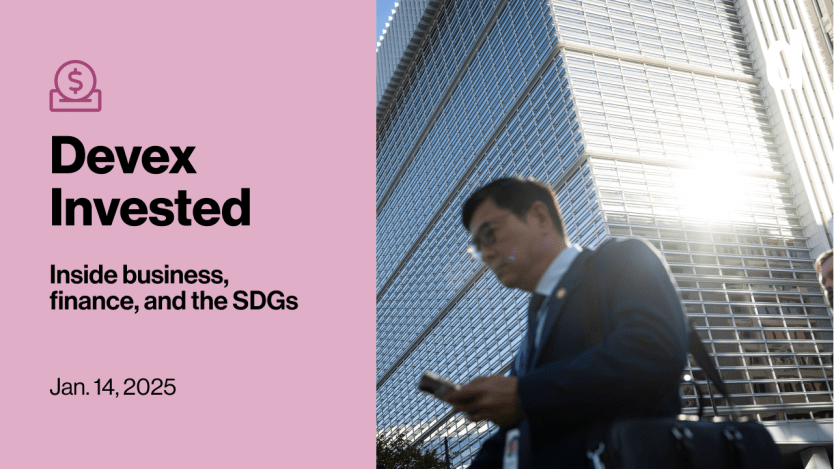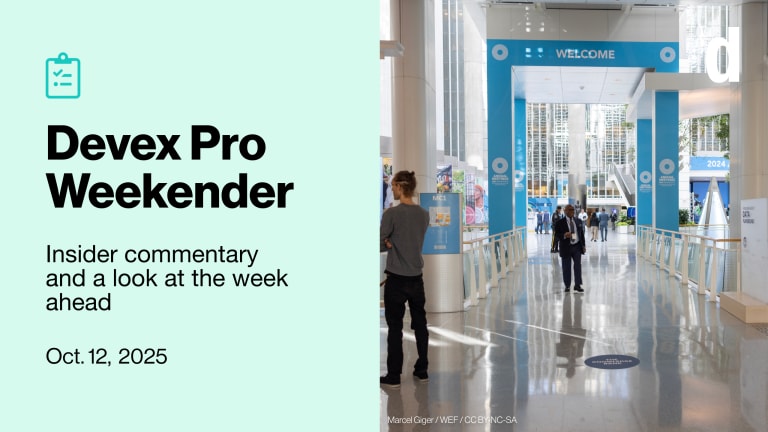
Donald Trump starts his second term as U.S. president next week, and ahead of his inauguration, I take a look at what his return to leadership could mean for the World Bank.
In many conversations with experts and former government officials, it seems clear that the bank will likely fare better than the United Nations — though almost everyone tells me that it's just too early to know exactly how things will play out. A complete withdrawal from the bank, which was discussed in the conservative Heritage Foundation’s policy blueprint, known as Project 2025, seems very unlikely.
“Anyone who thinks they know what will happen is pushing their own agenda,” a former government official tells me. The Trump administration will be transactional, and policy can change if there is a better deal to be had, the official says.
“There is no underlying philosophy for most of what he does other than he perceives it to be good for America,” the official adds. “That could be [supporting] the World Bank or to blow up multilaterals, especially if someone who works for him feels strongly one way or the other.”
Here’s what we know:
• What will matter most in determining U.S. policy toward the World Bank? Personnel. And some of the early U.S. Treasury Department picks seem likely to continue to value and engage with the bank, Eric LeCompte of the Jubilee USA Network tells me. But key posts may still take some time to fill.
• Last time around, the Trump administration approved a capital increase for the bank, securing some policy priorities, including a decrease in lending to China as part of the negotiations. The incoming president’s daughter and former adviser Ivanka Trump also played a key role in advocating for parts of the bank’s work and helped set up the Women Entrepreneurs Finance Initiative, or We-Fi. She doesn’t look to be as involved this time around, but a similar approach of trying to find an ally on the inside could help the bank.
• World Bank President Ajay Banga is taking a pragmatic approach to working with Trump, and in interviews, has called for people to stop speculating and focus on what he does. Banga has said that in his experience, Trump listens to reason and so his job will be to explain what he is doing at the bank, and how it can align with his priorities. Banga’s push on jobs and private sector involvement could align with Trump's priorities, but his push to expand climate finance will not.
• There are some big questions remaining. Not just about who gets some of the key jobs, but what the U.S. will prioritize. Could it call for further reforms, different incentives at the bank, more U.S. contracts? And importantly, where will the administration land on its contribution to the World Bank’s International Development Association, or IDA, its fund for the lowest-income countries? We’ll likely get a signal soon, in the president’s budget request and the congressional response, as to whether the administration will honor the pledge made in December.
Read: World Bank under Trump — what’s next for US influence and funding?
Do you know if Banga and Trump have already met? Do you have insights on some of the key Treasury appointments? Feel free to drop me a note at adva.saldinger@devex.com.
Winners and losers
In his annual take on how global development may change this year, Devex President and Editor-in-Chief Raj Kumar takes a look at some of the expected winners and losers. Among the winners: development finance institutions, including the U.S. International Development Finance Corporation, British International Investment, and others.
“It’s reasonable to expect these agencies to continue growing and taking more of the mantle for long-term development from development agencies,” Raj writes.
The multilateral development banks should also be OK — but they will need to continue evolving to meet infrastructure and climate transition needs and crowd in more private capital, he writes. U.N. agencies, however, may not be in favor, and other international organizations may have to make changes to succeed.
Read: In 2025 global development’s new era begins
Watch: The big forces that will shape global development in 2025 (Pro)
+ Not yet a Devex Pro member? Start your 15-day free trial today to access all our expert analyses, insider insights, funding data, exclusive events, and more. Check out all the exclusive content available to you.
Tough on crime
It’s not a traditional area of focus for multilateral development banks, but the Inter-American Development Bank is backing a new initiative aimed at tackling organized crime in Latin America and the Caribbean.
The Alliance for Security, Justice and Development launched late last year and brings together nearly 20 countries in the region. It grew out of concerns raised by countries about the cost of crime and a desire to tackle this often transnational issue collectively.
IDB estimates that organized crime costs the region an average of 3.4% of its GDP — which is nothing to sneeze at. It’s also responsible for half of homicides.
IDB itself plans $1 billion in projects tackling the issue this year and is beefing up its security unit as part of its reorganization, IDB President Ilan Goldfajn explained at a press conference. The bank will also work to get other donors involved in the initiative and contribute to the efforts.
Read: IDB-led initiative tackles organized crime in Latin America, Caribbean
Surprise!
£250 million
—That’s the roughly $307 million surprise increase that the U.K.’s development budget for overseas programs will receive, which will allay concerns of ongoing continued cuts to the aid budget, my colleague Rob Merrick reports. Most of the new funds are expected to cover the country’s contribution to the World Bank’s IDA.
Read: Shock rise in UK budget eases fears of fresh cuts
+ Check out our page with all the latest news in the U.K. aid sector.
Your next job?
Chief Development Officer
Landesa
Seattle, Washington | Washington, D.C.
What we’re reading
Africa has too many businesses, too little business. [The Economist]
Investor climate group suspends activities after BlackRock exit. [Reuters]
Creating development finance as an asset class. [World Economic Forum]
Fiji’s top policy adviser says “everything” is climate finance now. [Devex]








